“We value making patients feel welcome.”
Your donation will help Nurse Laguerre provide the highest-quality care to every patient in need.

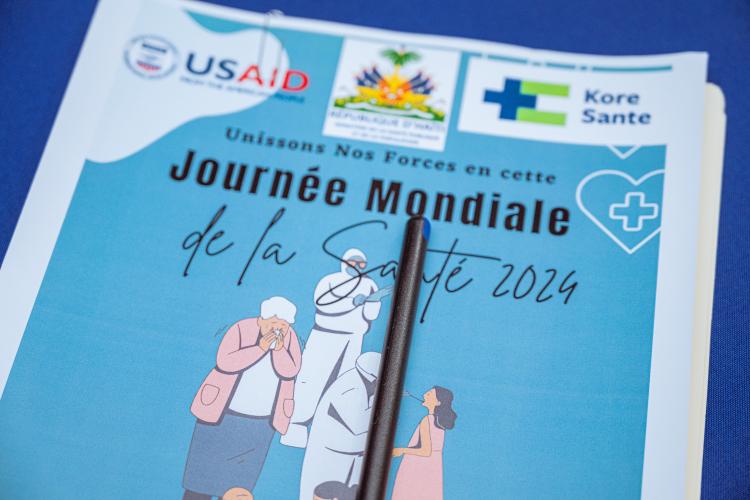
In honor of World Health Day 2024, the Kore Sante team convened two dynamic events aimed at mobilizing its partners to protect and promote the right to health during times of crisis.
In honor of World Health Day 2024, the Kore Sante team convened two dynamic events aimed at mobilizing its partners to protect and promote the right to health during times of crisis.
The World Health Organization created World Health Day to raise awareness about a specific global health issue or topic each year. The theme for 2024 is “My Health, My Right” and focuses on the urgent need for all people to access the resources and services to maintain good physical and mental health. According to WHO, the essentials include quality health services, health education, safe drinking water, clean air, good nutrition, quality housing, decent working and environmental conditions, and freedom from discrimination.
This year’s theme resonates deeply in Haiti as the ongoing humanitarian crisis has profoundly limited access to every item on the list above. As such, the Improved Health Service Delivery (IHSD) team—known as Kore Sante locally—organized a World Health Day symposium to bring its partners together to discuss how they can protect and promote the right to health even during times of great strife.
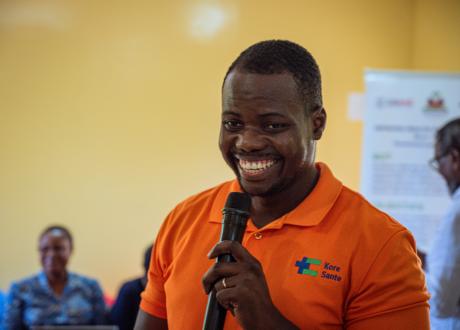
Dr. A. Galliote from the Kore Sante team
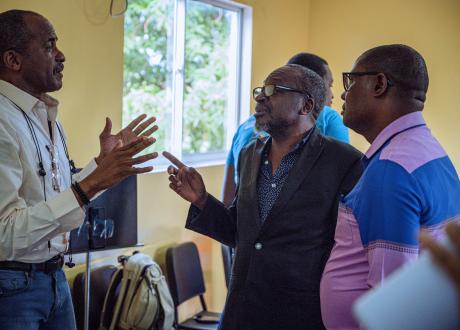
A Lively discussion between Dr. A. Duvelson, Department Director Grand-Anse, Ministry of Health, and Dr. M. Laroche, Kore Sante.
Kore Sante worked with the departmental health offices in the Nippes and Grand-Anse geographic departments to create the symposium, titled “Equity in Health: A Commitment!”. To maximize attendance in a time when travel in Haiti is difficult, the event was held in two locations: Jérémie on Wednesday, April 10, and Miragôane on Thursday, April 11. The event was also streamed online. Through these efforts, we welcomed a wide range of healthcare actors from more than two dozen healthcare facilities within the Kore Sante network. Participants also included representatives from the Haitian Ministry of Health and other partner organizations such as the United Nations Population Fund, Haitian Health Foundation, Malteser International, FHI-360, and others.
The symposia were broken down into five key topics, each led by a different expert. The topics were:
Each day concluded with a roundtable discussion that allowed three local health providers to share how they have ensured access to care during a time of crisis.
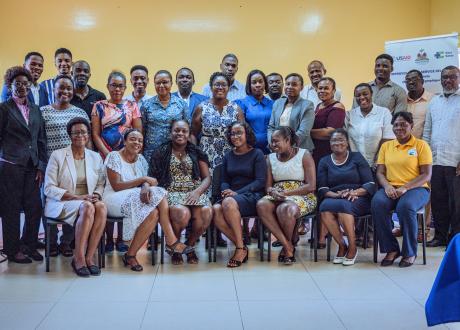
Symposium participants in Jérémie.

Attendee Annie Dulièpre, Malteser International, watches a presentation at the Miragôane session.
Attendees agreed that achieving universal health coverage in Haiti requires a thorough reform of the health system, which in turn requires both a strong commitment from the government and clear mid-to-long-term policies. However, the majority of healthcare actors in Haiti must reach a consensus on reforms, and the success of reforms depends on the availability of competent and sufficient human resources. “The problems are numerous,” said Ms. Zephirin, Departmental Director for the Ministry of Women’s Condition and Women’s Rights, Nippes, “and must be posed and analyzed in all their aspects to achieve in practice a health system that is beneficial: to the rich, to the poor and accessible to people in both cities and provinces.”
The groups also highlighted achieving health equity as essential to fulfilling Haitian citizens’ right to health.To accomplish this, healthcare actors must recognize existing disparities/inequalities and promote the values of social justice and solidarity. The concept of Social Determinants of Health and the United Nations Population Fund’s motto of “Leaving no one behind” resonated with attendees throughout these discussions.
Much of the symposium focused on different aspects impacting quality and accessible care provision. Staff turnover amid the ongoing crisis has strained many healthcare facilities, particularly in the Nippes department. Several participants shared their strategies for coping with extreme stress. Others emphasized that healthcare workers need more support and guidance on managing prolonged stress, including identifying the warning signs of stress and understanding its impacts on the individual and the workplace. Participants agree that more must be done at the local, regional, and national levels to mitigate some of the complex challenges causing strain.
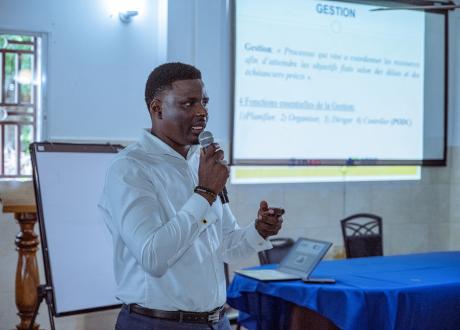
Samuel Loussaint, Kore Sante supply chain specialist, gives a presentation.
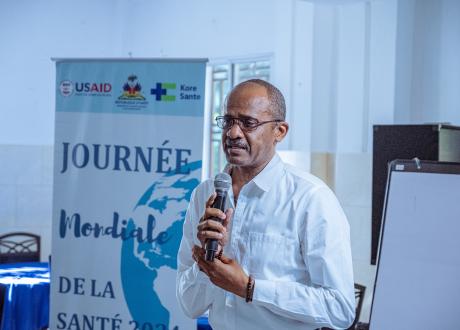
Dr. Mario Laroche, Chief of Party for Kore Sante, gives introductory remarks.
The groups discussed the ongoing lack of resources and its impact on care provision. During the crisis, critical resources have been hard to find and difficult to obtain due to travel insecurity. Without regular, reliable access to these resources, many healthcare facilities have been unable to ensure even basic services are available. Attendees expressed a desire for the state to help address the situation by more adequately financing the healthcare system as a whole.
Finally, attendees discussed ways healthcare workers can continuously improve the quality of care they provide even during crises. In particular, attendees underscored the importance of improving how patients are welcomed and ensuring patients understand their care options. “I would particularly like to focus on welcoming and assisting patients in situations of suffering,” said Ms. Annie Dulièpre, Field Coordinator for Malteser International. “We therefore recommend that healthcare staff be more open to patients, explain to them the different options available to them in terms of treatment, and fill these gaps compared to interventions often made without humanity.”
The crises in Haiti have made providing care even harder in an already difficult environment. But even during difficult times, all healthcare workers must remember their responsibility is to help strengthen the health system and promote the right to health. Together, healthcare workers and government leaders can help guarantee the right to health in Haiti.
Presentations:
Click to view and/or download presentations from the symposium (French language only).
Pour une Couverture Universelle en Sante & l’Universalité dans l’accès aux soins et services en Haïti, Dr. Garnel Michel, Activiste sur les questions de Protection Sociale en Santé
Couverture sanitaire universelle-Universalité dans l’accès aux soins et services, Dr. Jean Patrick Alfred, Coordonnateur Unité d’Etudes et de Programmation (UEP)/MSPP
Journée Mondiale de la Santé Equité et Droit à la Santé, Dr. Wilfrid Cadet, Conseiller Médical, Health Equity International
Le Droit a la Sante et L’Equite, Marie Lucie Chaudry, Chargée de Projet UNFPA Sud
La gestion du stress au travail, Pascal Nery Jean-Charles, Psychologue
Gestion Rationenelle Des Intrants, Samuel Louissant, Responsable Supply Chain du projet Kore Sante
Mesures Palliatives Durant la Crise, Mona Richeme, Point Focal Kore Sante, Direction Départementale Sanitaire de la Grande-Anse
Mesures Palliatives aux Déplacements de Staff Durant la Période de Crise, Pierre-Line Phanord, Assistante Chef de service de Planification et Suivi, Direction Départementale Sanitaire des Nippes
L’engagement des Partenaires pour le renforcement du système de santé et la promotion du Droit à la Santé, Dr. Mario Laroche, Directeur du projet Kore Sante
Colloque Journée Mondiale de la Santé Synthèse des messages–Clés de la journée, Dr. Jeffson Bercy, Conseiller Senior en Développement des Capacités Locales du projet Kore Sante
Your donation will help Nurse Laguerre provide the highest-quality care to every patient in need.
